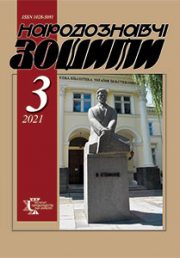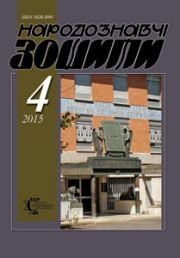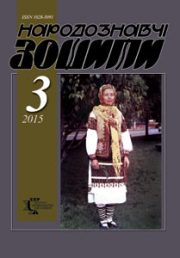The Ethnology Notebooks. 2023. № 1 (169), 250—256
UDK 821.161.2-14.09:[784.71:355.425(477.8)”19″УПА]
DOI https://doi.org/10.15407/nz2023.01.250
SOKIL Hanna
- ORCID ID: https://orcid.org/0000-0002-8352-2124
- Doctor of Philological Sciences, Professor,
- Ivan Franko National University of Lviv,
- 1,Universytetska Street, 79000, Lviv, Ukraine,
- Contacts: e-mail: gan.sokil@gmail.com
Abstract. The article investigates the heroic content of the songs of the OUN-UPA period, glorification and exaltation of the participants of the liberation struggle. The dominant positions of military heroism as the embodiment of ethno-cultural values of Ukrainians are considered. Currently, during the period of active struggle against the Moscow invaders, studies of the heroic deeds of Ukrainian soldiers are particularly relevant. This theme, depicted in folklore works, has become a powerful resource in the establishment of patriotism, a symbol of defiance, moral and ideological principles of a man.
The object of research is insurgent songs, and the subject is the heroic area, its interpretation as the utmost manifestation of selflessness and courage in battle, as well as the depiction and poetization of the spiritual greatness of the defenders of Ukraine.
The purpose of the proposed article is to analyze the problems of manifestation of the heroic actions in the rebel song by means of the poetic word, to consider the connection with the categories of aesthetic and tragic, as well as to reveal the image of the rebel hero through the prism of heroics. The regularity of the tragic in the conceptual-event and emotional spheres is emphasized. In the context of modern challenges, the consonance of rebel theses with the slogan «Heroes do not die» is projected. An attempt was made to compare the heroic motifs of rebel songs with the main ideas embodied in certain documents that were at the disposal of the soldiers, namely the Decalogue («Ten Commandments of Ukrainian Nationalists»); the continuity of folk song and its projection on modern events, the popularity of heroic themes and the prospects of its study for further research were emphasized.
Published folklore texts and field materials were used as the material for the article. The research methodology is based on the complex involvement of various methods, principles and concepts of socio-humanities, in particular the analytical theoretical and interdisciplinary.
Keywords: heroic, tragic, self-sacrifice, the image of the rebel, courage, valor, the domain of freedom, the spirit of rebellion.
Received 11.01.2023
REFERENCES
- Malynska, N. (2001). Proud heroics. Canon. Literature. Ontology of heredity. Kyiv [in Ukrainian].
- Yarmolenko, N. (2010). Ukrainian oral heroic epic: dynamics of tradition. Kyiv [in Ukrainian].
- Sokil, V. (2003). Ukrainian historical and heroic tales: structural, semantic and poetic aspects. Lviv [in Ukrainian].
- Rudakova, N. (2009). Specificity of folklore poetics in reproducing the heroics of the Cossacks. Literature. Folklore. Problems of poetics (Issue 32, рp. 363—368). Kyiv [in Ukrainian].
- Stratilat, A. (2008). The heroic image of the defender of the Motherland in Ukrainian folk thoughts and fairy tales. Literature. Folklore. Problems of poetics (Issue 30, рp. 269—272). Kyiv [in Ukrainian].
- (1982). Etymological dictionary of the Ukrainian language: in seven volumes (Vol. 1). Kyiv: Scientific Opinion [in Ukrrainian].
- Frolova, K.P. (1988). Kyiv. Heroic in literature. Ukrainian literary encyclopedia (Vol. 1) [in Ukrainian].
- Kravchenko, Ulyana, & Saliga, T.Yu. (1992). Enemies, like a flood, came without stopping… Streletskaya Calvary: an attempt at an anthology. Lviv [in Ukrainian].
- Demyan, H. (2003). Ukrainian rebel songs of 1940—2000 years (historical and folklore research). Lviv; Kyiv [in Ukrainian].
- Sokil, H. (2019). «In the spruce forest in Vyshnaya Rozhanka…». Chronicle of Boykiv region. ZSA — Canada — Ukraina (Part 1/96 (107), pp. 20—23) [in Ukrainian].
- Lavryshyn, Z. (Ed.). (1996, 1997). Songs of the UPA. Litopys UPA (Vol. 25). Toronto; Lviv: Litopys UPA [in Ukrainian].
- Sokil, H. (2004). Insurgent songs — heroic chronicle of the Ukrainian people. Volya and Motherland (Issue 2—3, pp. 146—152) [in Ukrainian].
- Demyan, G. (2000). Hutsulshchyna in the liberation struggle of the OUN and the UPA. Essay on history and folkloristics (Part 4). Vyzvol’nyj shliakh (Book 6 (627), pp. 37—53) [in Ukrainian].
- Trembitskyi, A. (2018). Rebel song — a component of oral and written culture of Ukrainians. Folk creativity of Ukrainians in space and time. Scientific collection (Pp. 534—545). Lutsk [in Ukrainian].






